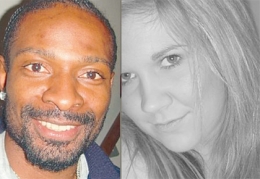Questions over double tragedy
Last update—Friday, April 1, 2011, 22:51 By Chinedu Onyejelem

Stephen Ukiwo and Katarzyna Bartowiaka—
an illegitimate multiracial child, a murder, and a
suicide, all brought to Ireland via open immigration
A Nigerian man committed suicide following the killing of his Polish partner on 1 March in the Tralee house where they lived with their two-year-old son. Stephen Ukiwo, from Abiriba in Nigeria’s southeastern state of Abia, was lost in the sea at Ballybunion hours after the body of Katarzyna Bartowiaka was found at their home. As an investigation into the double tragedy continues, it is expected that a public inquest will be held to ascertain the full circumstances surrounding the deaths.
A forensic examination of Bartowiaka just hours after her body was discovered found that she may have been strangled.
While members of the immigrant community condemn Bartowiaka’s killing, they are also wondering what became of Ukiwo, whose body has not yet been recovered.
Meanwhile, more details have emerged about the incidents. Some people who knew the couple believe Ukiwo may have accidentally killed Bartowiaka.
One person said: “Both the guy and the woman were very easygoing people. He loved the woman so much. I think it was a kind of accident and he regretted it very much and could not stand the shame.”
The source added that Ukiwo “really loved the woman, although they had relationship problems. He was not married to the Polish woman but was living with her and they had a son together.”
Ukiwo is believed to have had a Nigerian wife and a daughter, both of whom live in the Dublin area.
It is currently suspected that after strangling Bartowiaka, Ukiwo drove from their Tralee estate to the sea at Ballybunion, about one hour’s drive away.
“The sea is a five-minute walk from a Garda station,” said another source. “There [it is believed] he called gardaí and informed them about the incident and that he was going to kill himself.”
Contrary to speculation within the Nigerian community that Ukiwo’s actions may have been driven by a deportation letter he received last November, his friends say they do not believe that the killing nor his subsequent suicide have anything to do with it.
“He was frustrated that he could not work and provide for himself, the Polish woman and their son,” said a woman who knew the couple.
Metro Éireann understands that after Bartowiaka’s body was discovered, several gardai surrounded Ukiwo near a cliff edge in Ballybunion.
“There were also about six helicopters. It is believed Garda negotiators went straight to business and pleaded with him again not to kill himself,” the woman added.
But after a six-hour standoff, their attempts were unsuccessful and Ukiwo jumped into the sea.
Many who knew the couple believe that gardai have a lot of questions to answer in the way they handled the negotiation. One asked why neither Ukiwo’s two-year-old son nor other family members or friends were brought to speak directly with him or even over the phone.
They have also questioned the presence of armed gardai on the scene, as it is not known whether or not Ukiwo was armed during the standoff. The absence of Garda divers in the sea below has also raised suspicions.
Those who spoke to Metro Eireann stressed they do not in any way condone the killing of Katarzyna Bartowiaka, but that Stephen Ukiwo’s suicide means full details of the incident will never be known.
A Garda spokesperson told Metro Eireann that both incidents are “part of an ongoing investigation” and that they “won’t be giving details until the Coroner’s Inquest, which will be in a couple of months.”
Last month Superintendent Jim O’Connor of Tralee Garda Station told the media that “trained negotiators from An Garda Siochana were at the scene speaking and negotiating with [Ukiwo] for a long time.
“Unfortunately, despite our best efforts, tragedy occurred at about 10 pm [on 1 March] when the man lost his life,” he added.
Gardaí would still like to hear from anyone with information about either incident to contact them in Tralee at 066 710 2300 or via the freephone Garda confidential line at 1800 666 111.
James P. writes:
